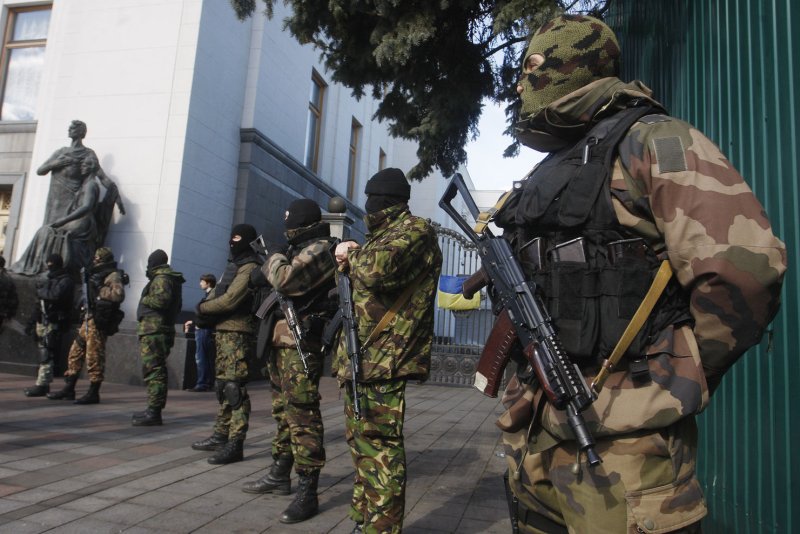Ukrainian self defense volunteers stand outside the parliament building in Kiev on March 17, 2014 a after the referendum on independence in Crimea. UPI/Ivan Vakolenko |
License Photo
WASHINGTON, March 27 (UPI) -- Ukraine has reached an agreement with the IMF to potentially access $27 billion, with the international lender agreeing to provide $18 billion in support over the next two years.
The interim government in Kiev and the International Monetary Fund have reached an agreement that will have the international lender providing the beleaguered nation with $14 billion to $18 billion over the next two years to limit the economic effect of the political crisis and to avert a default.
The IMF's board still has to sign off on the deal and officials say Ukraine could start receiving installments as early as April. The country, at risk of slipping into a third recession in six years, is dealing with dwindling foreign reserves and a weakening currency.
The onus will be on Ukraine to devalue its currency, reduce corruption and red tape and bring down its massive gas subsidies, which accounts for nearly 8 percent of the country's GDP.
Ukraine will receive a total of $27 billion over the next two years, including loans and loan guarantees from the United States and the European Union. The U.S. Congress is still squabbling over a $1 billion package for the country and the EU is seeking final approval for $1.6 billion.
The U.S., E.U. and the IMF have been cognizant of not placing very stringent demands on the interim government. Many of the belt-tightening conditions attached to such loans are highly unpopular and the lender is waiting until after the presidential elections to impose austerity measures.
These loans are in sharp contrast to the $15 billion package Russian President Vladimir Putin offered ousted president, Viktor Yanukovych, before he was removed from office. While the deal had no conditions, the Kremlin, after purchasing an initial $3 billion in Ukrainian bonds, cancelled the aid package after the ouster of Yanukovych.
Arseniy Yatsenyuk, Ukraine's interim prime minister, has said that the country needs close to $35 billion in aid over the next two years and that his country was “on the brink of economic and financial bankruptcy” and if things continued in this fashion Ukraine could see a 10 percent drop in its GDP.
As a part of the IMF agreement, Ukraine has agreed to narrow its budget deficit to 2.5 percent of gross domestic product by 2016. At the same time they will raise gas and energy prices, closer to their full costs.
Ukraine’s state energy company, Naftogaz, said Wednesday that it will raise gas prices by 50 percent on May 1, partly because the country has sizable gas stores and come spring consumption is expected to drastically fall.
The White House was quick to acknowledge the IMF's deal, calling it a "powerful sign of support from the international community for the Ukrainian government.”
“Together with our allies and partners, President Obama will continue to build international support for the Ukrainian people at this critical time,” said White House Press Secretary Jay Carney.
Carney also said that the White House was working closely with Congress to pass the $1 billion package.
[The White House]
[New York Times]
[Businessweek]










